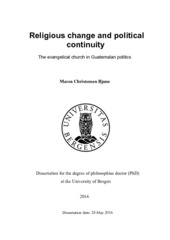| dc.description.abstract | This thesis explores the political implications of the rapid growth of Protestantism in Guatemala. Contrasting the considerable changes in the religious landscape, Guatemalan politics has long been characterised by continuity. As a point of departure, this thesis therefore asks: how can the large-scale processes of religious change have left the political status quo seemingly unaffected? Answering this, the thesis presents a detailed analysis of how the sharp increase of converts to Protestantism in the Guatemalan population has been manifested in the country’s political arenas. The study aims at contributing with conceptual insights to the research on how religious change affects politics, and to broaden the empirical knowledge of the composition and rationales of the Guatemalan political status quo. Methodologically, this thesis draws on a qualitative framework, which includes field research in Guatemala. The analysis is built on data accessed from in-depth interviews and observation of religious sermons and activities in Guatemala City. Based on the experiences and empirical insights from the field research in Guatemala the research subject is here conceptualised as ‘the evangelical church’, and analytical emphasis is placed on the omnipresence of evangelical churches in all parts of the country and the various roles they play in people’s everyday life. Hence, in addition to analysing the presence of the evangelical church in Guatemala’s political arenas, the thesis includes an analysis of the roles of evangelical churches as service providers, that operate both in the absence of the state, and in direct cooperation with it. The thesis reveals how this position at the local level, has brought the evangelical church into political positions at the central level in Guatemalan politics. In all, this is a detailed analysis of the development of the relationship between the Guatemalan state and the evangelical church, finding that evangelical churches have supported the state with practical and material assistance, as well as serving as an alternative religious ally to which political authorities and state officials have turned for uncritical endorsement. The thesis concludes that on the one hand, the sharp growth of Protestantism and the entrance of the evangelical church into Guatemala’s political arenas do constitute a clear change in the political organisation: the evangelical church has increasingly taken part in both defining and implementing political solutions, which has affected the state’s own operation and services. However, on the other hand, none of these practices appear to have challenged the balance of power in Guatemalan politics. This thesis argues that the political participation of the evangelical church has served to preserve the political status quo. | en_US |
